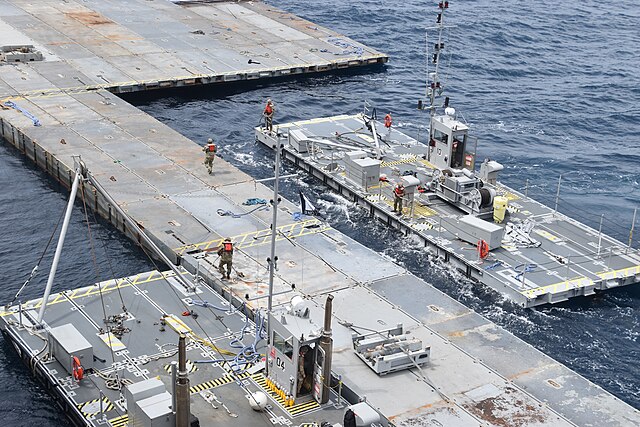On March 7, in his State of the Union address, U.S. President Joe Biden announced “the US military will embark on an ‘emergency mission’ to establish a temporary pier off the coast of Gaza, which will allow for the direct delivery of humanitarian assistance from the Mediterranean Sea.” A U.S. military ship has since departed to Gaza to build the seaport, which is expected to take two months.
Regional sources analyze the developments and challenges of the American response to Gaza’s humanitarian crisis:
In his March 7 State of Union address, U.S. President Joe Biden confirmed plans to “establish a temporary port on the Gaza coast to increase the flow of humanitarian aid to the beleaguered territory,” according to Sky News Arabia. This pier, Biden explained, will be able to “receive large ships carrying food, water, medicine and temporary shelters” and thus “enable a massive increase in the amount of humanitarian assistance getting into Gaza every day.”
The Times of Israel quoted a senior Biden administration official: “We’re not waiting on the Israelis. This is a moment for American leadership, and we are building a coalition of countries to address this urgent need.” The Times shared administration officials’ clarifications that “ the project will not require US boots on the ground in Gaza. Instead, US military personnel will be present on vessels offshore while the pier is being built.”
On March 10, U.S. Central Command announced that an army vessel, the General Frank S. Besson, “left Joint Base Langley-Eustis in Virginia ‘less than 36 hours after President Biden announced the US would provide humanitarian assistance to Gaza by sea.’” Arab News noted that “Gaza has no port infrastructure,” and “the US initially plans to use Cyprus, which is offering a process for screening cargoes that will include Israel officials, removing the need for security checks in Gaza.”
The Jerusalem Post cited construction time and cost as having invoked criticism from several observers, including U.S. aid officials and diplomats. As discussed in the source, “the project could take up to 60 days to complete, which is problematic as United Nations officials claim that Gazans are currently facing a famine and are in need of immediate aid… The full cost of the infrastructure could be tens of millions of dollars. It is unclear if these costs are for only the port or if they also include the cost of the supply shipments.”
The plan has also been perceived by some “as an attempt to divert attention from hundreds of thousands of starving Palestinians and Israel’s consistent blocking of assistance to the enclave.” Al Jazeera juxtaposed Israel’s restrictions of “the entry of humanitarian aid into Gaza by land” and the U.S.’ work-around efforts to “airdrop 36,000 meals in northern Gaza” while still “supply[ing] the Israeli military with weapons.”
The Saudi Gazette analyzed the growing humanitarian crisis in Gaza. World Health Organization Director-General Dr. Tedros Adhanom Ghebreyesus said last week that “much more lifesaving humanitarian aid must be allowed into Gaza where one in six children is dangerously malnourished in the north of the war-torn enclave.” Amplifying this concern, “video testimony from Kamal Adwan Hospital’s pediatric unit highlighted the massive scale of needs which UN humanitarians and partners have been unable to relieve.”
Asharq Al-Awsat quoted U.S. Secretary of State Antony Blinken’s urges that Israel maximize aid accessibility and delivery in Gaza: “It requires more crossings. That requires more aid getting in. And once that aid is in, it requires making sure it can get to the people who need it. So we will continue to press that every single day because the situation as it stands, is simply unacceptable.” This advocacy coincided with aid parcels being airdropped by the U.S., among other countries.
